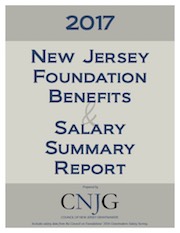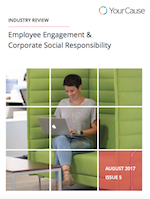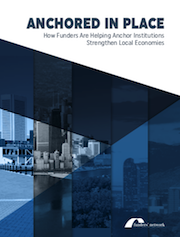Site Search
- resource provided by the Forum Network Knowledgebase.
Search Tip: Search with " " to find exact matches.
Since 1998, Alliance Magazine has been the leading magazine for philanthropy and social investment worldwide providing news and analysis of what’s happening in the sector.
The latest 12 issues of Alliance are behind a paywall and are available only for subscribers, although selected articles are made freely available. The remainder of the archive is free to all.
We are pleased to partner with Alliance magazine to offer our members and your members a 20% discount on new print and digital subscriptions. Simply enter 'Forum20' at checkout to claim your discount.
CNJG’s community foundation services (through the United Philanthropy Forum) breakdown into three categories:
1. a national listserv for CEOs
2. two in-person boot camp trainings
3. discount on the On-Line CF Express Training
National Listserv for Community Foundation CEOs
CNJG’s listserve for Community Foundation CEOs connects to a national listserv for the CEOs of community foundations. This active listserve allows community foundation CEOs to communicate easily via email with community foundation CEOs from across the country, to pose questions, engage in conversations and more. The service is being made available to our community foundations members as a benefit of your membership with CNJG and is operated by the Untied Philanthropy Forum, which is CNJG’s national network.
If you are interested in participating in this national community foundation listserve, please contact Craig Weinrich.
Community Foundation Boot Camps
The United Philanthropy Forum offers two or more Community Foundation Boot Camps a year that are made available to CNJG members at the member rate as a benefit of CNJG membership. The two-day Community Foundation Boot Camp program offers a comprehensive overview of the structure and operations of a community foundation. The program is an ideal in-depth introduction to community foundations for new community foundation staff, community foundation board members, or more experienced community foundation staff looking for a good refresher.
On-Line CF Express Training
The Forum is partnering with Kansas Association of Community Foundations (KACF) to offer a $400 discount on KACF’s On-Line CF Express Training. The online training and certificate program focuses on core essentials over a 15-module series that covers nearly every aspect of community foundation work: from asset development and quality grants programs design to fiduciary and policy matters. Plus, enjoy 24-hour-access to the easy-to-navigate short (5-15 min) modules in any order from the comfort of a home or an office, in private, or as a group training.
Watch the CF Express Training Promo Video and view a sample module (password: mod15) to learn more. To take advantage of the discount, sign-up at https://cfexpresstraining.com and enter discount code: Forum2018. You can also reference the following attachments for more details.
 Family Philanthropy Online
Family Philanthropy Online
In partnership with the National Center for Family Philanthropy, CNJG members have complimentary access to Family Philanthropy Online — a web-based knowledge center that provides practical advice and knowledge on a variety of relevant topics. Continually updated, the site provides members with access to the latest resources to inform their philanthropic efforts. Logged in CNJG members may access Family Philanthropy Online directly from our website through our members-only portal.
*The use of FP Online is only available to CNJG staff and family foundations. Community foundations, philanthropic consultants, and professional advisors must subscribe themselves.
Family Philanthropy Webinars
Every second Thursday of the month, CNJG members have the opportunity to participate in interactive webinars featuring presentations and Q&A sessions with nationally recognized experts in areas of family philanthropy, also presented in partnership with the National Center for Family Philanthropy. These webinars are free for CNJG members. You can access the registration page for these webinars from the CNJG website. Please note, registration for these webinars is separate from CNJG’s website. Directions on how to register are available on CNJG’s website page for each webinar. Our online tutorial has directions on how to register for a NCFP webinar.
Please note: only webinars that are indicated for “members of one of our Family Philanthropy Online Partner Communities” are free for CNJG family foundation members. NCFP offers many different webinars for various audiences. If you don’t see that phrase in their price description, you may not be able to attend that webinar. If you have any questions, please contact Craig Weinrich.
CNJG members are eligible for a 20% discount off the only peer-reviewed journal of philanthropy - The Foundation Review - a product of The Dorothy A. Johnson Center for Philanthropy and Nonprofit Leadership at Grand Valley State University. The journal, written by and for foundation staff and boards, provides rigorous research and writing, presented in an accessible style. It will share evaluation results, tools and knowledge about the philanthropic sector in order to improve the practice of grantmaking, yielding greater impact and innovation.
To receive the discount, use FORUM18 as your discount code.
Directors & Officers liability insurance provides financial protection for a foundation and its directors, officers, employees, and volunteers in the event of a lawsuit. CNJG offers its members the D&O liability insurance program provided through Aon Association Services, underwritten by The Hartford and endorsed by the United Philanthropy Forum. A discount is available to foundations with current membership with CNJG.
Fiduciary Liability and other coverage is also available to members at a discounted rate. Coverage is available in all states. Brokers can access the Forum’s D&O program through Aon Association Services.
Learn more using the documents below, on the Aon website or by contacting Jason Tharpe, program administrator at Aon Affinity, at 202-429-8561. To obtain the discount, foundations should let Aon know they are a member of CNJG, a member of the United Philanthropy Forum.
Stanford Social Innovation Review is a quarterly magazine produced by the Stanford Center on Philanthropy and Civil Society at Stanford University.
CNJG members are eligible for $10 off a subscription to Stanford Social Innovation Review (SSIR). The discounted rate is $39.95 for a one year print plus digital subscription for U.S. subscribers who subscribe online with credit card.
To obtain this discount, visit the Forum & CNJG members page on the SSIR website.
SSIR also offers a free enewsletter, announcing news and events of interest to nonprofits, foundations, and socially responsible businesses. Signing up is very fast and easy—just go to their homepage and enter your email address in the enewsletter box.
A pictorial overview of CNJG's first 20 years.
Giving circles and other forms of collective giving (hereafter referred to as GCs) have grown significantly in visibility and popularity over the past 15 years. Often started by donors, they are widely understood to be highly flexible, democratic, do-ityourself vehicles for giving. Previous research has illuminated the positive impact that participation has on the giving and civic engagement of donors. Until recently, however, our understanding of the scope and scale of GCs was 10 years out of date!
This research presents an updated understanding of the current landscape of GCs and similar models of collective giving or giving collaboratives in the United States. This research comprises the first of a three-part inquiry, which also looks at research underway related to the impact of participation in GCs on donor giving and civic engagement, and a study of the relationships between GCs and their hosting organizations.
Top 10 findings from a three-part study of giving circles, their impact and their relationship with their hosting organizations significantly updates our understanding of the current scope, scale and significance of giving circles and other models of collective giving in the U.S. Additionally, this study deepens our understanding of the impact of participation in giving circles on donors’ giving and civic engagement and offers actionable information related to the relationships between giving circles and their hosting organizations.

The 2017 New Jersey Foundation Benefits & Salary Report provides a valuable benchmarking resource. Developed and compiled for Council members exclusively, the report presents comprehensive benefits data specific to New Jersey's grantmaking community, alongside data from the Council on Foundations' annual salary survey. Produced every few years, this benchmarking report is a highly valued benefit of your membership in the Council of New Jersey Grantmakers.
The first section, 2017 Benefits Summary Report, includes benefits data for the 2017 calendar year and covers employment, leave benefits, insurance benefits, and more. The second section, 2016 Grantmaker Salary Tables: New Jersey, Mid-Atlantic and National Data provides data on compensation across a wide range of positions and grantmaking entities.

Twice a year, the YourCause team publishes our Industry Review focused on evaluating employee engagement and corporate social responsibility programs. This report uses performance data collected by the YourCause Employee Engagement platform between January and December of 2016. We identify trends, activities and benchmarks in employee engagement and corporate social responsibility. Our clients, industry peers, and other interested parties may use this data as a barometer for performance measurement.

Anchor institutions can play a vital role in strengthening and connecting local economies, and can serve as powerful drivers for building inclusive and equitable communities. This report by the Funders’ Network for Smart Growth and Livable Communities as part of its Anchors Institution Funders’ Group examines the potential these deeply rooted local enterprises hold to create lasting and sustainable change—and illustrates how funders are working with anchor institutions to create healthier, more equitable, and economically vibrant places to live and work.
The report offers recommendations for funders looking to deepen and refine their strategies for working with anchors. In each of the profiled communities—Albuquerque, Baltimore, Chicago, Denver and the Twin Cities—the report shares stories of how funders are extending beyond traditional grantmaking roles to embrace their roles as conveners and leaders in their communities.
Evaluators, foundations and nonprofits need to examine the “fit” of our existing evaluation approaches with the principles and values that underlie grantmaking and efforts designed to advance equity.
CNJG's Storify content from their Signature Events.
For this suite of resources, GrantCraft captured the wisdom of philanthropic leaders who have participated in multi-party advocacy collaboratives and conducted a literature scan of how foundations talk about advocacy-focused collaborative work. Drawing on additional themes and ideas explored in earlier GrantCraft pieces about funding advocacy and donor collaboratives, they synthesized new information to dig deeper and understand the pain points and levers of success. Examples have been anonymized to ensure candor and clarity, as well as to broaden the appeal and applicability of wisdom derived from a specific collaborative example. The bite-sized articles are intended to make this work easy to reference and share, and to read either as a full body of work or in shorter spurts as is helpful and relevant to your work.
The William and Flora Hewlett Foundation has had a long-standing commitment to increasing the effectiveness of grantmaking organizations, a commitment reflected in its Philanthropy Grantmaking Program. In 2015, the Foundation commissioned Harder+Company Community Research, in partnership with Edge Research, to conduct a field scan to inform its own strategies in this area as well as those of other organizations working to increase philanthropic effectiveness.
The Foundation was interested in learning more about how foundations find knowledge and how it informs their philanthropic practice. The scan focused on practice knowledge, which the research team defined as anything about the effective practice of philanthropy irrespective of the programmatic issues that are the goals of most grantmaking. The research team used a variety of methods to ensure that a wide range of perspectives are reflected in the field scan findings, including interviews with staff and board members from 75 foundations, an online survey of foundation professionals that had 738 respondents, four in-depth case studies, and a literature review. The field scan was exploratory and offers findings from foundation staff and board member perspectives.
These profiles highlight the economic importance, diversity, and community impact of the charitable sector in each of the 50 states.
These resources are from CNJG's 2016 Annual Meeting & Holiday Luncheon where the topic of shifting demographics was explored. Research by the Pew Research Center shows that New Jersey, and the nation, is experiencing the most striking social, racial, economic, and demographic shifts that have not been seen in more than a century. Funders will need to address the new challenges this “next America” will face, including an increasing aging population, greater racial tapestry, the influence of religion and technology, and more.
Philanthropy and the Social Economy: Blueprint 2017 is an annual industry forecast about the ways we use private resources for public benefit.
Foundation Center is pleased to again partner with Lucy to offer the Blueprint as a GrantCraft guide. The Blueprint provides an overview of the current landscape, points to major trends, and directs your attention to horizons where you can expect some important breakthroughs in the coming year.
The William Penn Foundation commissioned a study to move beyond the anecdotal and see if and how students benefited from being involved in some of its grantee arts programs. The research by WolfBrown, working with Johns Hopkins University, showed that participating in the arts help students develop traits that contribute to later success in life. Younger students especially showed measurable growth in characteristics like tolerance for other points of view, an understanding that hard work can develop their knowledge and abilities, and their motivation to achieve.
